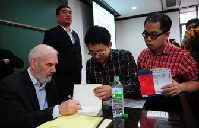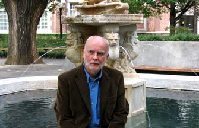BNU names first poet as writer-in-residence
Updated: 2014-03-19 16:13
By Han Bingbin (chinadaily.com.cn)
|
|||||||||||
Beijing Normal University's dazzling list of writers-in-residence, which includes such renowned names as Mo Yan and Yu Hua, was updated on March 16 with Ouyang Jianghe joining the elite league. Ouyang is the first poet to take part in the residence program.
Born in Sichuan province in 1956, Ouyang Jianghe (originally named Jiang He) started writing poetry in 1979. He soon rose to fame in the literary circle for both his striking language structure and the profound social connotations of his verse, which had a significant influence on the poets who followed.
|
|
|
|
In a symposium at BNU on March 16, Yu called Ouyang a "broad and complex" poet for relating history to modern times. Mo, who won the Nobel Prize in Literature in 2012, said Ouyang's poems always touch on the essence of life and the poet has the ability to make his culturally profound and philosophical poems understandable to the general public.
While compliments were paid to Ouyang's literary achievement at the symposium, the poet said he wants to hear more criticism. He said that since many new things have occurred so rapidly in modern poetry over the past three decades, it's harder for classics and milestone pieces to emerge.
"Our poems are still just the questions, not the answers," he said.
Ouyang also said during the symposium that one of his biggest childhood dreams was to become a college professor. However, he never had the chance to even attend college as he was already 35 when he retired from his service in the army.
"So I am really grateful that BNU has given me this opportunity to come to the college," he said.
During his one-year residency, Ouyang will visit BNU at least once a month, looking for new inspiration, giving lectures and, most importantly, communicating with young students.
Poets are usually a little removed from reality, he said, therefore "we need more young blood and thoughts."
Related Stories
Path of his own pen 2014-03-11 10:09
Ten richest Chinese authors in 2013 2013-12-14 13:43
List announces China's 60 richest authors 2013-12-06 09:31
Artist blends kids' outlook with his own 2013-12-03 13:05
Spanish writer's act of faith 2013-11-19 11:19
Today's Top News
Thai radar may have detected missing jet
Ukraine rejects Crimea treaty
Tourists to be refunded for smog
Chinese authorities upgrade food waste fight
First lady's visit to boost goodwill
Chinese authorities upgrade food waste fight
Xi to sign flurry of deals in Europe
Li vows not to give up plane hunt
Hot Topics
Lunar probe , China growth forecasts, Emission rules get tougher, China seen through 'colored lens', International board,
Editor's Picks

|

|

|

|

|

|







